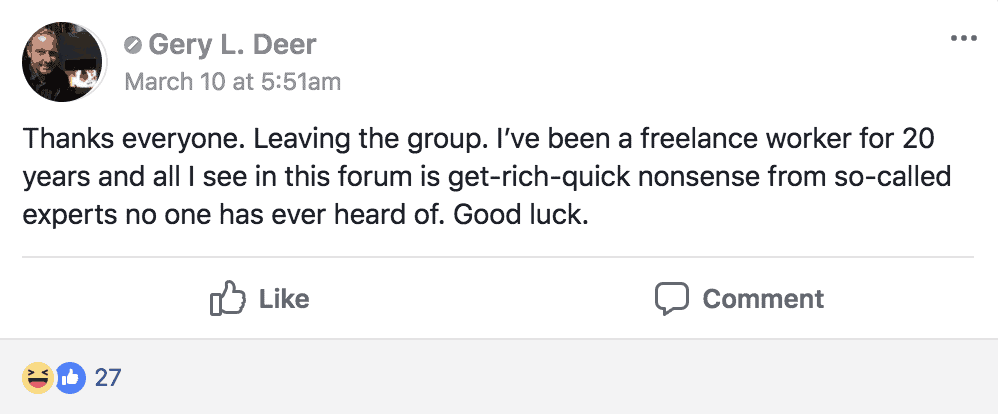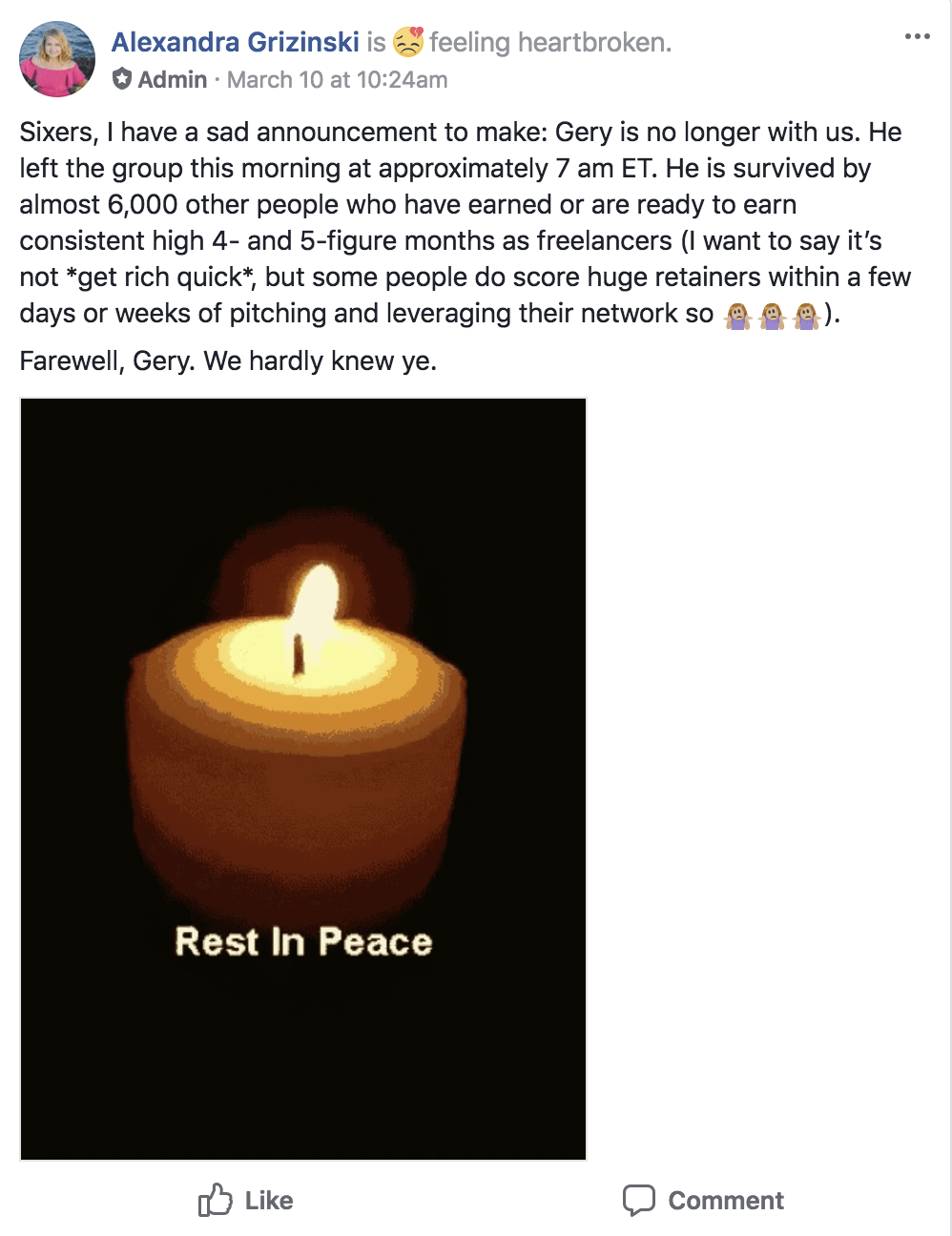Updated 2/26/19. Please note that this article may contain affiliate links.
We live in a day and age where the possibilities for making money are seemingly limitless.
The online marketplace has opened up opportunities for entrepreneurs living anywhere in the world. No longer must you suffer through a long commute and endless in-person meetings to make a living (unless you’re into that).
The Internet-enabled global economy makes it possible to work wherever you want and whenever you want—as long as you don’t let this newfound flexibility get the best of you. Certainly, not everyone will have the propensity to successfully act as their own boss.
But let’s say that you have the drive.
Let’s say you have a great business idea.
Let’s say you have some kick-ass skills that you know are worth something to the right client.
What most people new to the idea of freelancing or starting an online business lack is a process.
Certainly, there are many things to learn to find success going out on your own. Suddenly, you have to play a whole host of roles that you’ve never really had to think about before. Roles that are normally handled by full departments of people at the average corporation.
Once you start your own freelance gig or online business, you’ll have to do many (probably all) of these things in addition to the work that you can charge clients for:
- Bookkeeper (I just outsourced this!)
- Project manager (especially if you work with contractors)
- Hiring manager (see note above!)
- Accounts payable/Debt collector (not the most fun of these new roles)
- Business development
And it goes on, and on, and on…

After years of trial and error in my own business, I compiled this list of 150+ online resources to help you get started.
So where, or perhaps, from whom do you learn about how to successfully start an online business?
Enter business coaches and online courses. Ok, and masterminds.
If these terms are new to you, you’re fresher to the world of online business than most. Welcome!
Here’s a quick run-down of what each entails:
- Business coaches: Individuals who work with business owners/freelancers to create accountability and build strategy, often based on their own relevant business successes. In many ways, they’re like consultants.
- Online course: A collection of knowledge focused on a specific topic, taught like an online class you might take at a university. Sometimes includes learning resources (like workbooks or quizzes). Online courses are self-guided but sometimes includes access to periodic group coaching sessions over the phone.
- Masterminds: First popularized in the masterpiece Think and Grow Rich (I recommend giving it a read or three), masterminds are a consistent/scheduled meeting of the minds between people with similar businesses/stages of business growth. The goal is to create accountability and to help each group member problem solve business issues as they come up. Masterminds create symbiotic relationships where members give and get.
A little fine print:
In some cases throughout this article, I will use these concepts somewhat interchangeably—as they are often interconnected “products” or at the very least, different ways to work with the same types of individuals. Many business coaches create online courses, for example.
I’ll also be making some generalizations about these people. There are certainly outliers to the picture I’ll be painting and I’ve even referenced some of them at the end of this article.
So that all sounds pretty straightforward, right? There are many resources that can help you take your fledgling online business to the next level.
But what happens when you place your trust (and savings!) in the wrong entity that was supposed to get you there?
What happens if a coach, course, or mastermind promises to deliver something that can’t be taught?
Jump Ahead to a Specific Section:
You Can’t Teach Hustle
It’s time for some #unpopularopinions.

First, let’s just get this out of the way…
You can teach people a lot of different skills—but you can’t teach hustle.
That’s not to say that people can’t learn hustle. Just that it’s not something that you can go to a class for, sit and take notes, and voila! Suddenly, you’re a hustler.
Here’s the thing:
Building a successful business takes a lot of time. It takes a lot of blood, sweat, and tears (more so the latter two than the first).
A Journey from Poor Freelancer to Successful Business Owner
I’m a fairly risk-averse person in my personal life and I will admit that this carries over into how I run my business.
I detailed many of the exact steps I took to take my freelance gig full-time in Your Month-to-Month Guide to Starting a Successful Freelance Blogging Business (geez, that’s a mouthful of a title, now that I’m thinking about it!).
If you have a full-time job, I lay out THREE MONTHS OF SPECIFIC TASKS you really ought to complete before leaving the security of the corporate world. And that’s really underscoring all the work I did to get to that point—I had been freelancing on the side of my “regular” jobs for many years before moving to freelance full-time.
Here’s the other thing:
I did have guidance. I had a mentor.
Thanks to incessant networking, I found my own way to get the help I needed to fill any knowledge gaps I had transitioning to a full-time freelancer. Certainly, I didn’t bug him for Every. Single. Thing. I had questions about—but it was nice to know he was there if I needed him.
And regardless of the knowledge I gained access to—thanks to my awesome mentor—it’s not like he was going to do the work for me.
I had to do the work.
I had to bust my ass pursuing clients who wasted more of my time than the scant pay was ever really worth. I had to toil away many nights, weekends, holidays, and even sick days—working hard to grow my little business into something great.
And I don’t mean it to sound like a bad thing—just trying to show that first getting started and pushing through situations as they popped up taught me a number of invaluable lessons that I take with me into my business dealings today.
Especially how to deal with awful clients.
And here’s one more thing:
Sometimes? Business success is just luck: pure and simple.
No skill or drive can compete with the perfect moment, meeting the client of your dreams who’s ready to work with you.
But enough about my story for now.
The whole point of laying out some high-level aspects of my journey from freelancer to successful business owner was simply to illustrate that it totally is possible to make it on your own, without paying thousands of dollars each month for a business coach or pawning your engagement ring to be able to afford a multi-thousand dollar online course from a person who’s greatest success is the power of their own personal branding.
Which makes for a great transition…
When Paying for an Online Course Means Not Making Rent
The spark that eventually erupted into the idea for this article came to me sometime last year, when I was a member of Kimra Luna’s Freedom Hackers Facebook Group.
Like many, I was swept in by the story of Kimra Luna, who went from living on welfare to starting a(n alleged) multi-million dollar online business.
I mean, is there anything that screams “American Dream” more than that? Truly, she inspires many to pursue their dreams—showing them that success is possible even in the most seemingly hopeless circumstances.
But… I found my own Kimra Luna hero worship suddenly come to an end after participating in an intriguing but heartbreaking thread on her Facebook group.
She had just opened up the doors to her latest and greatest online course, Be True, Brand You. The premise was something about how building a great brand would result in tons of business #gains.
Which is all fine and dandy but at the time, the course retailed for many thousands of dollars. I believe it was more than the current course sales page claims (the link is now offline)—a cool $2400.
Many of the people commenting on this Facebook group thread were ravenous to get their hands on Kimra’s course. But the main problem? Nobody had the $$$ required to make it happen.
Nowadays, many course creators offer the option to do a payment plan. This seemingly benefits the student—it’s “cashflow-friendly!”
…Or so claimed a recent Copyhackers program, where the option is to pay $1997 upfront or $197 USD for a year (a total of $2364)

Personally, I think charging such a high interest (a 16.831% difference in cost between the two options) on a payment plan seems predatory… although I understand that course creators offering this option are trying to hedge the risk of someone suddenly stopping payment before the series is complete.
The thing if, if an online course doesn’t cost ~$2k—would a payment plan really even be necessary?
Back to the Freedom Hackers Facebook group.
People were jumping over each other to show off the lengths they were willing to go for a program they weren’t really able to pay for with their current financial situations.
As already referenced, one woman mentioned pawning her engagement ring. I’m sure it was for a relationship long over… but it still made me feel weird. Another person, well into adulthood, mentioned that they would be begging their parents to help cover the cost of the first payment on the course’s payment plan.
Did Kimra not see that her Internet celebrity in the world of online business was driving people to make decisions that would jeopardize their ability to pay rent? Or did she just not care—even though she herself had just gotten off welfare?
And either way—what does that say about her as a thought leader/champion of the people?
Dozens of people commented with similar outrageous lengths they would go to pay for a course they didn’t actually currently have money for. It was turning into a competition to see who was willing to give up the most.
When I commented to express my distaste in the direction the conversation was heading, I was promptly attacked by her loyal followers—and even Kimra Luna, herself. I was asked to leave the group.
🙃
Ringing in my head was the thought that you can’t build a truly great business by operating with the same greed many corporations do.
If you’re looking to profit greatly off the backs of people who don’t have a lot to spare, then your business does not add anything positive to the world. Consider that the next time you count your riches.
What’s the Value of an Online Course?
The value you place on something is subjective.
I might think that the new iPhone is worth $250 and pass… but you might wait in line and happily shell out that $1000 because of the way it makes you feel.
Like many other online course creators, Kimra Luna’s audience is primarily made up of dreamers. These are people who want so badly to get out of a bad situation (like she did) to find success their own way (like she did).
These willing customers make the assumption that the prominent figure behind a course will somehow rub off on them, sometime during the process of going through a series of recorded video lessons. Ok, and maybe some extra learning resources and group calls.
I’ll tell you what—I’ve never taken a course that has fundamentally changed the way that I run my business.
I have taken courses that provided great guidance into picking up a new skill. A recent example is Making Sense of Affiliate Marketing, where, for less than $200, I got a front-row seat (and documented processes) into the mind of affiliate marketing success story, Michelle Schroeder-Gardner.
BTW, that’s an affiliate link for the course. If you buy it, I make money—empowering me to make more content like this (or, you know, actual helpful stuff).
When it comes to things like online courses and business coaches, I’m a realist.
I know that the only way to find success is to put in the work. Any course or coach that claims that their paid content will do the work for you is just lying.
The High Cost of Desperation
At the end of the day, online course creators need to hold themselves to a high ethical standard when it comes to selling their info products—especially if they’ve built a large and loyal audience.
The people who buy $2k+ online courses tend not to be the same people who make rational business decisions.
Ok, ok, there have got to be some exceptions—just like any rule. But roll with me here for a minute.
Save for the people who have already found some type of success and are simply looking to scale their business to the next level, many people who sink money into business coaches and online courses for their online business are acting out of desperation.
And I don’t mean that as a stigma. I mean it as a matter of fact. If you’re desperate to make something work, wouldn’t you try anything to make it happen?
A lot of business coaches and online course creators take advantage of this fact with marketing/launch “best practices” that include pricing that tops out over $1000 a pop, a super short timeline for enrollment, and “high-value” bonuses that most people never actually care to access.
The idea of scarcity sometimes carries over to how many people can be enrolled in a given program at once, even though, as is the case with online courses, the content is already created—you’re just providing access to it.
All this said, I don’t intend to diminish the value of an honest person’s services and educational content. I just mean to make you think twice about something that costs so much but is only available to purchase for a very short period of time.
The Role of Authenticity
I don’t mean to keep picking on Kimra Luna but I’m trying to paint a picture of why everyone should be skeptical of business coaches and online courses with pricing in the multi-thousands of dollars.
Most popular courses have pages and pages of reviews on relevant search engine results pages and websites that aggregate customer reviews. Kimra Luna’s Be True, Brand You? Pretty slim pickings from which to do some research.
While searching to try and determine if I was being unfair and if her course was really worth the $2000 price tag, I came across this Ripoff Report.
There was another interesting SWOT analysis type article but it’s now offline. Regardless, in both situations, there’s speculation as to her expert knowledge when it comes to teaching the classes. Based on many articles describing her promotional processes online, it sounds like she should really be teaching people about Facebook Ads.
But Be True, Brand You is described as being all about finding your passion and defining your professional personal brand. Is it just me, or is it silly to think that people who successfully complete this course will be sufficiently armed to pay back a $200 monthly fee if they have to pawn wedding rings to afford it in the first place?
To be sure, branding and building thought leadership is important. I preach about it all the time. But it’s a long-term strategy. If you’re a struggling freelancer, it’s not going to pay the bills in the short term.
Kimra Luna promotes her course as the answer to her followers’ pressing financial woes—but how could it be?
And what makes her qualified to teach it?
Which brings us to another perfect transition…
This whole post was finally pushed into action as a result of what I consider to be an unprofessional public exchange.
It happened in The Six-Figure Freelancer Community. Ostensibly, the Facebook group exists to support its two proprietors (Jenny Beres and Alexandra Grizinski) and their online course/business coaching businesses.
A long-time group member (and apparently, someone who knew at least one of the founders in person), decided to announce his departure:

Totally childish right? And everyone knew it, defending the two ladies who founded the group:

But that wasn’t enough. One of the two of the group’s proprietors decided to get in the last word, even though, at this point, the group member was long gone:

I chimed in that I thought it was tasteless, since he wasn’t there to defend himself from what was becoming a very long comment thread of jeers.

I was asked to leave.
Is it just me or am I a magnet for Facebook group DRAMA?

Both of the group admins got extremely defensive over this particular (now) ex-member’s claim that they were frauds. He made it sound like they didn’t have the experience (or bank deposits) to back up what they were charging members for.
I decided to reach out to one of the few people who agreed with me that the rebuttal was tasteless (I’m not immune to confirmation bias). Sierra DeVuyst had this to say about the subject and it really resonated with me:
“You can fool losers, but you won’t trick the people that are winning.”
She admits that its a paraphrase of Gary Vee but I’ll take it.
I have yet to see any proof that these two are qualified to be teaching other freelancers how to make six figures…
In fact, try searching “six-figure freelance academy” (the flagship online course product’s name) and you won’t find anything not owned by the brand it relates to—except a little spam.

I think what I’m ultimately trying to get at with this article is that you, as a consumer, need to be smarter than the average online course/business coaching scarcity-induced promotional tactic.
This means seeking input besides the customer testimonials provided by the course creator. It means connecting with non-biased students who’ve actually taken the course. You need to specifically find out what about the course helped them to bring more money or efficiency into their business.
Look for concrete examples—otherwise, the people to whom the course is a sunk cost may just be trying to justify a bad decision. Confirmation bias, or trying to justify the decisions you make, is a real issue when it comes to seeking the truth (if you don’t have a process in place to dig it out).
I actually joined the aforementioned group initially for a sense of camaraderie. As evidenced by experience in writing freelance-focused articles for clients like WPMU DEV, AND CO, The Write Life, and GoDaddy—they’re kind of my people.
But as a result of this weird exchange, I decided that this clearly wasn’t the group for me.
The group’s leader was so willing to push me out for simply disagreeing with how she handled a particular situation. Their loss—I’ve achieved six figures in revenue in less than two years of doing this thing full-time. To date, I’ve never paid for a business coach…
…but I have paid for a few (reasonable) online courses.
Yes, I’m a Course Creator
Before I come off as a hypocrite, I’d like to mention that I myself am a course creator. I’ve also provided coaching for a number of blogging clients. But I’m not in it to make millions—although a little passive income would be nice!
For real, though, my online course creation doesn’t make me much but it allows me to build my audience and test ideas for something bigger (more on that in a moment).
That’s why I started my first real foray into course creation on Skillshare.
My most popular class so far? How to Write a Kick-Ass Blog Post. The cost to access it (and several thousands of other really useful classes)? $15/month or $8.25/month if paid annually.
I’ve also created a Skillshare class based on my own success with How to Negotiate a Six-Figure Freelance Salary. Again, you can access that without having to spend hundreds of dollars.

Check out an up-to-date listing of all of the Skillshare classes I’ve taught.
For the average new freelancer, I think that this point of entry is a lot more reasonable when it comes to seeking specialized help.
Of course, if you as a course creator are not benefiting from having a marketplace like Skillshare literally bring you new students and followers, you’ll have to charge more to cover your own production and marketing costs.
I’m also creating a course for Teachable that will cover the in’s and out’s of creating a WordPress website: with considerations for customizing your theme, choosing plugins, and even what to write on that damn About page you keep stressing about.
And I won’t be charging anywhere near $1000 for it.
So sign up for updates (and to apply as a beta tester in exchange for free access) if that’s of interest. I’ve finished most of it but it will likely be a few more months until it “officially” launches.
Look guys, I know that I’m starting to develop a reputation as a complainer—although I prefer to think of myself of someone who calls it like it is. But, I hope that you can understand that at the end of the day, I’m just trying to help other freelancers find success—not get taken advantage of.
The same motivation is the reason why I volunteer my time to organize and run monthly Freelancers Union events in Denver.
How to Be an Ethical Course Creator (or Business Coach)
If you’re a fellow online course creator and you’re worried that you might be taking advantage of your audience, I’d encourage you to consider my tips for being an ethical course creator:
- Teach a specific skill—not hustle. I’ve said it once and I’ll say it again: you can’t teach hustle. People have to do the work. Furthermore, just because something worked for your business coach doesn’t mean it will work exactly the same for you. All that said, business coaches and online course creators can make a difference in teaching people skills that aren’t typically covered in regular classrooms—I think that’s their competitive advantage to traditional education and consulting.
- Speak from experience. Don’t lie about experience you don’t have. Show proof or link to off-site testimonials so that there is no question.
- Offer a minimum 30 day no questions money back guarantee (note that Kimra Luna’s Be True, Brand You neither offers a refund or money back guarantee over any period of time). If you’re worried that people will take advantage of you, consider adding a level of completion limit. For example, if someone has made it through 75% of your course, they are no longer eligible for any refund. Make sure this policy is clear to all who purchase your course.
- Don’t charge so much that you’re putting a loyal follower in a position where they might purchase from you at the expense of paying for rent. Anything over $1000 is excessive for a non-accredited program being marketed to the struggling freelancer demographic. I don’t understand how some people can charge prices comparable to a semester of community college.
- Offer options for different budgets, based on different levels of hand holding. Make a bare-bones option available—perhaps an ebook that covers the same material you walk students through for a higher price on video. This will give people access to you at a budget they can afford, while pushing those who want the more “done-for-you” help towards paying an additional fee for that convenience. Spending a little extra effort to create multiple tiers that help people with low budgets will pay off in good karma that positively affects your paid offerings in terms of loyal brand reps and potential sources for testimonials.
- Use psychology to your advantage to push those to buy who would do so anyway BUT don’t abuse your powers of persuasion to convert those who are desperate and struggling. It’s a fine line, so ask a trusted group for feedback before heading straight into a stressful/pushy three day launch.
- Consider a monthly pricing model. Erin Flynn offers monthly and yearly access to her client and processes lessons, part of a platform that she regularly updates with new learning resources. You get a discount based on what you can afford at the time and your trust in her ability to keep delivering quality content—but can also choose to just pop in for a month at a time when you can justify the cost. In many cases, this type of pricing model and production schedule encourages many students to stick around in anticipation of your new content.
- Underpromise and over deliver on value. Or, in other words, don’t play up lame bonuses that aren’t worth their “retail” value. Make a truly awesome course that’s packed with value and bonuses are hardly necessary.
- Masterminds should be free. You have it in your power to connect with and organize a monthly (or weekly!) meeting of the minds. A good mix of people who are on the same level—and those just above it—would make for a nice group structure.
- Offer unlimited access to content. If someone buys a course, they should have access to all future related updates. Additionally, they should be able to decide for themselves how your course fits into their busy lives—without the stress of a deadline.
- Cut the shit on excessive email drip campaigns and pressuring time limits. Or, just them use sparingly—ok?
- Value yourself and your time but not at the expense of putting a loyal follower into a place where they might not make rent. I’m not saying you shouldn’t make money with online courses or as a business coach. Just be real and be fair. Don’t take advantage of someone who is struggling and doesn’t know better when it comes to pricing.
- Every once in awhile, give back. If you’re starting to feel like you’re making too much money… why not offer to give some back? Melyssa Griffin is a course creator I have a lot of respect for and it only went up as a result of her semi-recent fundraising initiative. She offered discounted access to her popular courses in exchange for donations, not taking any cut of the proceeds. She ended up raising $119,227 for charity as the result of her efforts.
…and I’m curious to hear what you’d add to my list of ways to be an ethical course creator.
So—drop me a line on Twitter. I’ll retweet the best ideas!
Or, better yet, challenge me. Share your opinion.
What do you think of the current state of affairs with online course creators like Kimra Luna or business coaches who charge thousands of dollars per month?
Tell me.
TL:DR;
If you’d prefer a quick walkthrough of this article, check out this awesome presentation that Canva made for The Blogsmith:













Thanks a bunch! Stick around for my never-ending rants 😉
I really informative article Maddy, I hope I can read a lot of your writing more.
Hey Angela,
Interesting perspective! I appreciate you sharing your unfiltered opinion, it’s good feedback.
Maddy
It seems like you’re trying to piggy back on the success of popular coaches and digital course creators to promote your own courses. This cracks me up because not only are you a hypocrite, you seem to be jealous of their success. P.S. there are people at all types of price points. I personally would not trust the value of your courses at those rates. It sounds like you are struggling to get clients and are dropping names to steal business. WHERE ARE YOUR ETHICS.
Hey Cara,
I appreciate your thoughtful comment. And I think you make a lot of fair points, even though I don’t necessarily agree with them.
It’s definitely a risk to take such a public stance against people who have amassed a large online following — the proof is right here in your comment! I don’t love confrontation, but when I observe situations that don’t sit right with me, I call them out. I think you might be able to appreciate that, as that’s exactly what you’ve done here.
You’re actually the first person I’ve talked to who’s had a positive experience with Kimra Luna. So I’m glad that whatever money you put into hiring her for help, it actually worked out for you. I wonder if it had anything to do with the fact that you’re not her typical client? I won’t claim to know your story, but looking at your website, it appears that you’ve achieved success outside of the world of marketing — I’m just wondering if the opportunity to work with a more high-profile client influenced her approach to working with you (you mentioned what sounds like a tailored one-on-one component, working with her Systems Strategist). According to many others who I’ve either conversed with directly, or who’s testimonials I’ve read online, that’s not a typical result.
I’m calling attention to this point because as I’ve detailed in this article, I’m mostly abhorred by Kimra Luna’s approach because of the way that she uses her rags-to-riches story to attract people who are desperately seeking ways to build a profitable business, then pushes them to make sacrifices to make payments on course material that they honestly can’t justify.
As others have claimed here in the comments, it’s not that great course material can’t justify a price tag in the thousands — but you’ve got to know your audience. If you know that they can’t afford this and press on, to me, that shows a lack of care for their wellbeing.
Specific course creator personalities aside, I agree with everything else you’re saying about how to approach learning and implementation around online course material. In the past year, I’ve ponied up money for complete access to helpful industry-related courses that include iThemes training, lifetime access to WPSessions, OptinMonster University, and Masterclass. Yes, the person who bitches about course creators has spent a pretty penny on learning new things. 😉
Best of luck with your search for help with SEO! Depending on what you’re looking for, I’d be happy to recommend a good fit partner — feel free to email me at madeline.osman@gmail.com.
Maddy
P.S. I love promoting honest and ethical entrepreneurs. Here’s an article I wrote recently featuring my business bad ass friend Andréa Jones and her extremely reasonable online learning community: https://www.theblogsmith.com/social-media-bootcamp/
Attacking another entrepreneur because others haven’t been successful is not being “honest.” What I’m reading in these screenshots is you repeatedly telling business owners and admins how to run their own communities or businesses and then when they kindly ask you to leave or remove you, you create a blog post attacking them. This is an article about ethics, that’s for sure. It’s basically a guide, screenshots included, to not being ethical online.
I’ve worked with Kimra and she’s been amazing. She brought me her own Systems Strategist that got me out of 15+ hours a week of tasks by creating better systems for me. You’ve written this entire article as if revenue is the only possible goal a person has from online programs and that’s a poverty mindset. If you aren’t already making enough money, you need to focus on better serving your clients so that your demand increases and you can raise your own prices, not on hiring a coach or buying a course.
Once you’ve actually built a business that’s financially successful, you pay for things like time freedom, employee loyalty, faster training times, etc. While some of these things immediately impact your bottom line, some don’t. It doesn’t mean they didn’t work, it means you need to invest in programs that align with the goals at the level you are at.
A coach or course creator can’t guarantee you a level of financial success because you’re hired them to teach you, not to do it for you. This is like going to college and then being mad that you didn’t get the job you wanted. Your teachers aren’t being paid to do the work to get you that dream job. They’re being paid to teach you the skills you need to go implement yourself.
Have you ever considered that maybe you’re just not ready for these types of programs instead of just attacking them? Also, maybe you could consider using your SEO knowledge to promote people you do believe in instead of for smearing negativity at others?
I found this article while browsing for SEO agencies to partner with, but after reading this…. I can’t imagine working with someone so negative, someone who publicly attacks others, even if you are clearly good at SEO.
Claudia,
You’re the first person to comment who’s actually gone through one of Kimra Luna’s programs so I really appreciate hearing your perspective. I’m also grateful that you’ve shared your story here, in a place where it might help steer other people in the right direction when they’re just starting out and looking for mentorship.
As a fellow solopreneur, I can understand the struggle you describe in terms of tying various aspects of your life and business together. I can also understand the desire to seek guidance when it comes to making changes and finding opportunities for business growth! It’s a shame that some entrepreneurs see this as a vulnerability worth exploiting for their bottom lines when it could be an opportunity to build real relationships that pay off for both parties in the long term.
At the end of the day, all we can do is live and learn. And share these lessons with the people around us. Let’s both keep promoting the types of people who have earned our trust (and hard-earned dollars!).
– Maddy
Clara – Maybe not so much brave as I have a chip on my shoulder and a loud mouth. 😂 Thanks for stopping by and sharing your opinion!
THANKS FOR SHARING THE TRUTH about these scam artists!!!!!!! you are brave!
Clarrisa,
So glad to be a resource as you grow your Etsy store!
Maddy
Hi Maddy,
Thanks for this great post! I’ve just decided to start a blog to help promote my Etsy shop. I haven’t yet started though, just trying to research everything possible and available to hopefully make good and wise decisions, as I currently don’t have a lot to spend on courses or anything. I’m just glad to be aware of these potential pitfalls, to be warned to be wary. I’m excited to begin my journey soon and I’m definitely going to keep learning all I can from you! Thanks again.
Rachel,
I appreciate you taking the time to share your experience. Obviously, I haven’t worked with either of them, so I can’t speak to their effectiveness—but I believe what you’re telling me and I’m glad that you got value out of engaging with them. All I can say is that I was definitely turned off enough as the result of that exchange to no longer be interested in hearing what they had to say about business growth. It’s a shame, as someone who is also currently booking six-figures, I had a lot to contribute to that group. I think what I’m trying to say, both in this post and in this comment, is treat people how you want to be treated. Good karma prevails. It’s just good business. 🙂
Maddy
Hello Maddy,
I agree with most of what you are saying. As a new freelance writer, I find it frustrating that all coaches seem to be a minimum of $1000. I’m to the point where I just assume it’s to much.
I wanted to throw my two cents in about the six figure freelancer group. I’ve been a member since… almost the beginning and remember this very conversation. First, I totally agree the whole situation was a little on the petty side. I was a little surprised it devolved in that way. I will even agree that if you google Jenny and Alex, you don’t see a whole lot to prove they know what they’re doing, but I do have some 1 on 1 experience with them.
When I became a member they had a group coaching program, much cheaper than any direct coaching they do now and it eventually was replaced with the Academy, in sorts. It was just a few hundred dollars, I signed up but was only able to afford it for 1 month, but for the sake of fairness, I learned a lot that month.
Within a week I was getting responses from major company’s and I didn’t have a single article/blog post published. Jenny taught me to write a pretty bomb pitch. My emails had an open rate in the high 90 percent-ish and response rates in the 70’s. The women who were in the group with me are mostly high earners now…some shockingly high and some are the women who gave the testimonials on the academy page. They were also making very little money, 500 to 1000 dollars a month and Jenny and Alex really pushed to get them making money.
I definitely don’t think they are everyone’s cup of tea, but they have a very take me as I am attitude and really encourage students to adopt that same method. Although polarizing, it seems to work well for landing retainer clients.
Camilo,
Since I like to ramble in my rants, it only seems fair to allow my readers to do the same! 😉 I want to start by saying that I really appreciate the time you took to think about and respond to this topic.
I admire your ability to push through and turn a bad situation into a lucrative business opportunity. I don’t know many people who kick that much ass—you’re an inspiration to me.
You bring up a great point about charging what you’re worth and you’re right to say that it’s something that I still struggle with. I recently raised my prices and plan to do so again in the new year. I do it when I think I’ve “earned it”—that helps me feel confident when pitching higher rates.
One thing I try to keep in mind when it comes to pricing is my audience. My major problem with people like Kimra Luna is that her rags-to-riches story attracts a lot of people who are still in that “rags” stage. Having previously been a member of her Facebook group, I was a personal witness to her encouraging people who clearly had nothing to make bad financial decisions in order to afford her programs. To me, if you’re trying to help people who have nothing to make a positive difference in their lives, you don’t charge $2000+ for an online course. She had little consideration for the audience she was serving.
Now, a corporate entity seeking help is another story. They’re not depending on your content to make sure that they make rent or to help them find ways to feed their families. They’re looking for ways to grow existing revenue or take their business to the next level (as you say, transformation). I know I also mentioned CopyHackers and their “cash-flow friendly” (hah) payments but that is again because I think they have little consideration for their audience—which is primarily made up of struggling/newbie freelancers.
So to answer your question of whether or not $2k-5k is a worthwhile value, again, I think it comes down to consideration for your audience and what they can reasonably afford (without putting themselves into financial trouble – which you mentioned you’re not interested in). Are you selling to well-off consultants or other corporate entities? If so, I think that the value and pricing is fair.
Of course, this is all my two-cents. I appreciate that I’m not the only one with an opinion. XD
Thanks again for taking the time to share yours!
Mary, first of all, this is a great article. But I do have to disagree on some of your points regarding value/price. I’ll explain by giving you a personal experience.
Earlier this year, I was diagnosed with colon cancer. A month later I lost my job. So, I started my own maketing consulting/teaching business. I figured this was the only reasonable thing to do given the year-long road ahead with chemo, multiple surgeries, etc.
For added context, I would like to point out that I am an advertising professional with almost 20 years of experience. I’ve developed strategy and campaigns for many household brands, mid-size and small business alike. So, marketing is truly what I do for a living.
One of my first personal clients is an accounting firm. Their messaging was inconsistent. The brand architecture and visual expression needed a lot of work. And they struggled to tell a simple story that clearly explained what the company does, why they’re different and why it mattered to their audience.
I charged several thousands dollars to conduct a one-day brand workshop. Within that time, we uncovered a powerful value proposition. We developed a clear mission/vision. We identified a defensible positioning statement, brand values, etc. Shortly after, she landed her first two retainer clients. A third one is already a sales qualified lead. Combined, these clients represent tens of thousands of dollars in annual revenue.
So the question is…was my fee (roughly 10% of current revenues) not worth it? My client argues that I didn’t charge enough! More specifically, if I packaged my workshop into a course that delivers similar results…would an investment of $2-$5K not be worthwhile value?
As we all know, we live in a capitalistic, free markets society. I would never take money from someone I couldn’t help. Nor someone so financially compromised they have to pawn sentimental property or spread payment over multiple cards. But, I am more than comfortable charging a premium for transformation. That’s ultimately what my work delivers.
Sounds like you’re a rock star in your own right. Maybe it’s time you re-evaluated your value. It doesn’t sound like money is a primary driver for you based on your post. But I bet you’re probably undercharging a bit for your time and services. Don’t be afraid to ask for what you’re worth.
Thanks for letting me ramble for a bit too long.